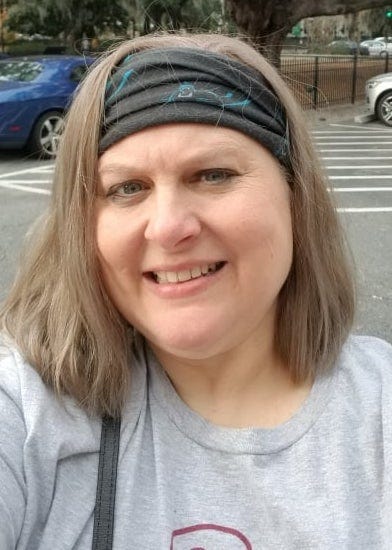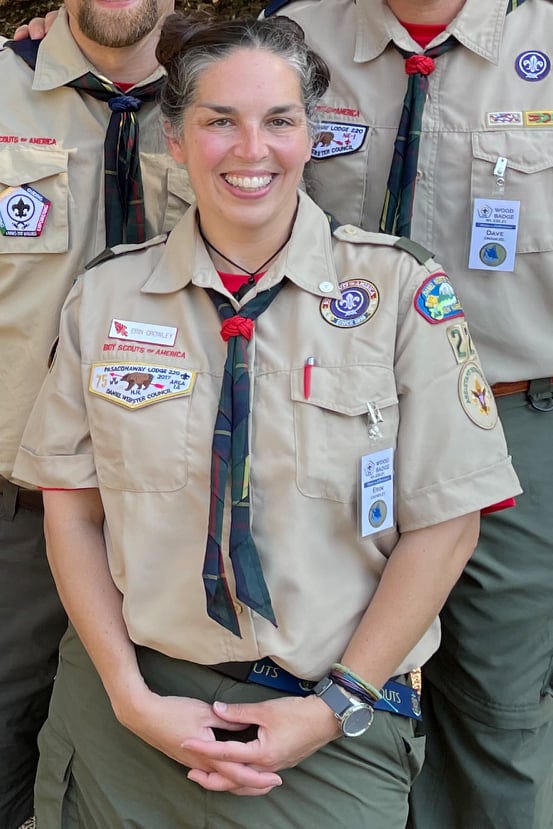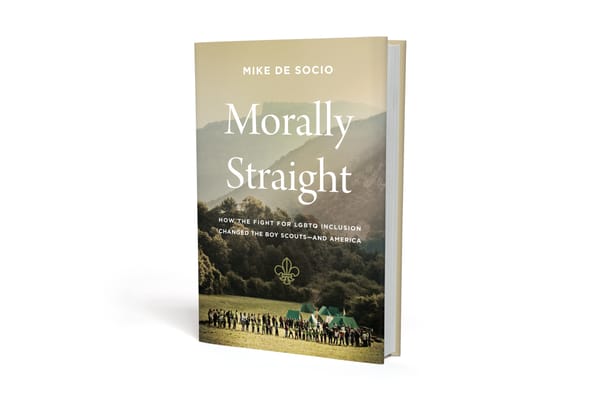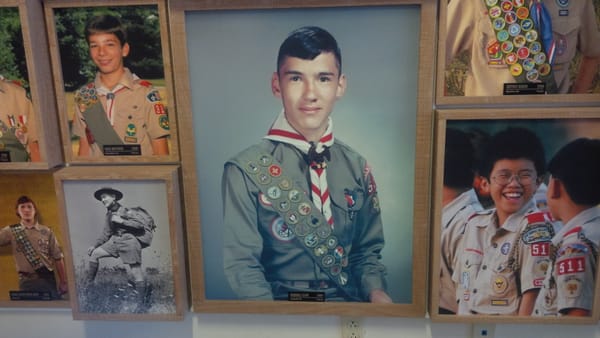How Wood Badge tickets can serve as a vehicle for LGBTQ+ inclusion
The leadership training program for Scouting's adult volunteers is inspiring some to take action around LGBTQ+ inclusion in their local troops and councils.

When Amanda Pace Edwards presented her goals for the Wood Badge training program, her counselor worried they might be a bit too ambitious.
Your stuff is pretty involved, maybe you need to dumb this down a little bit, the counselor told Pace Edwards. “I said, ‘No, I think not. I think not.’”
Pace Edwards, the scoutmaster of a Scouts BSA troop in South Carolina, says the vision for her entire Wood Badge “ticket” is to make Scouting a more inclusive and diverse organization. The ticket is a set of five goals that Wood Badge attendees are meant to complete after the course, which is aimed at developing leadership skills in adult volunteers who will then ultimately improve the Scouting program.
Typically, at least one of the five ticket goals is supposed to be focused on diversity. That’s been part of the Wood Badge program since its turn-of-the-century update, according to Randy Cline, a Scouting volunteer who helped develop that version of the course. “We felt like it was important to have diversity and a more inclusive environment,” he told me.
Cline chaired the most recent update of the Wood Badge course, which took place within the last few years, and said there was “overwhelming” support for keeping the diversity requirement. Ultimately, the course asks adults to think about how these ticket goals will have an impact on the youth they serve.
Pace Edwards’ main goal is to educate the adults in her council on LGBTQ+ basics — the definitions of gender and sexuality, why pronouns are important and how adults can support queer and trans people — with the hope that it will lead to a more accepting environment for youth.
“[The adults] don’t understand, and not understanding leads to fear, and there’s nothing to be afraid of,” Pace Edwards said.
She’s put together a PowerPoint presentation she plans to show to the adults at a council roundtable. “I’m not worried about the kids, they’re very accepting of it,” Pace Edwards said.

Pace Edwards isn’t the only scouter using Wood Badge as a vehicle for diversity, equity and inclusion work.
Tayler Hein, a professional scouter who runs the Scoutreach program for the Illowa Council in the Quad Cities, is hoping to use their ticket to create a directory of LGBTQ-inclusive units in their area.
They also plan to set up a table at one of the Quad Cities’ Pride events next summer, where they’ll be present in uniform and able to talk to people about inclusive Scouting.
“I just want to be a beacon of, ‘It’s safe to be in Scouting and be queer here.’ Because our council is fairly quiet about that kind of thing, and I want to be louder about it,” Hein said.
Hein, who is also Scouting's first (known) openly nonbinary full-time employee, said their ticket goals received a bit of pushback at first, out of concern that it was a “touchy subject.”
“We’re getting to the point where it can’t be a touchy subject anymore,” Hein said. “I’m just throwing myself out there and hoping people respond.”
Hein also plans on becoming a counselor for the forthcoming Citizenship in Society merit badge (the new name for the badge focused on diversity, equity and inclusion). And they hope to create a Scoutreach uniform closet, where youth can go to borrow used Scouting uniforms if they can’t afford their own.

Erin Crowley, an assistant scoutmaster from Massachusetts, is also focused on presenting Scouting as a welcoming and accessible space for youth.
Crowley and her son are involved with a linked troop in Amherst, New Hampshire — a community that is overwhelmingly white (and straight and cisgender, in Crowley’s estimation.)
One of Crowley’s Wood Badge ticket goals is to revamp her troop’s website and social media presence to be explicitly inclusive of diversity. That means swapping gendered terms like “mother” and “father” to more neutral ones like “scout leader” or “adult.” It means including more photos of people of color and disabled scouts. And it means adding a whole page about current membership standards and the accommodations her troop can make for scouts with special needs.
Crowley has already made many of these changes; the home page now says, or practically shouts, “ALL ARE WELCOME!!”
“We don’t care who you are, how you identify, youth and adult, as long as you believe in this program,” Crowley told me. “That’s all we care about.”
On Facebook, Crowley is working on a post that shares a timeline of inclusion milestones in the BSA — namely the policy changes around gay members and girls in the past decade. At first, the troop’s scoutmasters were hesitant to make that kind of statement, for fear of alienating more conservative members. But the scoutmasters ultimately supported Crowley in bringing it to the troop’s chartering representative, who not only approved of but encouraged the post, Crowley said.
“It’s something that’s important to me. I believe in Scouting, I believe in the power of this program,” Crowley said. “The thing that would kill me would be that a youth didn’t come to Scouting because they felt like it wasn’t for them.”


